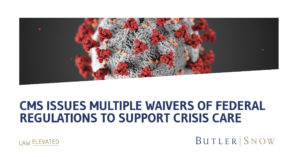On March 13, 2020, the Centers for Medicare and Medicaid Services (CMS) issued blanket waivers of certain requirements following the President’s National Emergency Declaration. Current waivers are briefly summarized below. Forthcoming Butler Snow articles will provide greater details and analysis of certain waivers and pending guidance as that becomes available. In addition to the blanket waivers, providers may seek specific waivers directly from CMS. Most of the waivers will end no later than the termination of the emergency period, or 60 days from the date the waiver or modification is first published unless the waiver is extended, provided that EMTALA and HIPAA waivers have separate timelines. Also, note these waivers are retroactive to March 1, 2020.
Current CMS Waivers:
Skilled Nursing Facilities
- CMS is waiving the requirement at Section 1812(f) of the Social Security Act for a 3-day prior hospitalization for coverage of a skilled nursing facility (“SNF”) stay for patients who need to be transferred to a SNF as a result of limited space due to COVID-19. In addition, for certain beneficiaries who recently exhausted their SNF benefits, it authorizes renewed SNF coverage without first having to start a new benefit period.
- CMS is also waiving 42 CFR 483.20’s timeframe requirements for Minimum Data Set assessments and transmission.
Critical Access Hospitals
- CMS is waiving the requirements that Critical Access Hospitals limit the number of beds to 25, and that the length of stay be limited to 96 hours.
Housing Acute Care Patients In Excluded Distinct Part Units
- CMS is waiving requirements to allow acute care hospitals to house acute care inpatients in excluded distinct part units, where the distinct part unit’s beds are appropriate for acute care inpatient.
Medicare Advantage Waiver
- CMS is waiving limitations on payment for health care items and services provided to Medicare Advantage beneficiaries when the health care professional or facility is not included in the plan’s network.
Durable Medical Equipment
- Where Durable Medical Equipment Prosthetics, Orthotics, and Supplies (“DMEPOS”) are lost, destroyed, irreparably damaged, or otherwise rendered unusable, contractors have the flexibility to waive replacements requirements, such that the face-to-face requirement, a new physician’s order, and new medical necessity documentation are not required. Suppliers must still include a narrative description on the claim explaining the reason why the equipment must be replaced and are reminded to maintain documentation indicating that the DMEPOS was lost, destroyed, irreparably damaged or otherwise rendered unusable or unavailable as a result of the emergency.
Care for Excluded Inpatient Psychiatric Unit Patients in the Acute Care Unit of a Hospital
- CMS is waiving requirements to allow acute care hospitals with excluded distinct part inpatient psychiatric units that, as a result of limited space due to COVID-19, need to relocate inpatients from the excluded distinct part psychiatric unit to an acute care bed and unit.
Care for Excluded Inpatient Rehabilitation Unit Patients in the Acute Care Unit of a Hospital
- CMS is waiving requirements to allow acute care hospitals with excluded distinct part inpatient rehabilitation units that, as a result of limited space due to COVID-19, need to relocate inpatients from the excluded distinct part rehabilitation unit to an acute care bed and unit.
Supporting Care for Patients in Long-Term Care Acute Hospitals (“LTCHs”)
- When a LTCH admits or discharges a patient in order to meet the demands of COVID-19, the LTCH is permitted to exclude the patient’s stays from the 25-day average length of stay requirement. This measure will allows these facilities to continue to be paid as LTCHs even when certain patients do not meet stay requirements.
Home Health Agencies
- Provides relief to Home Health Agencies on the timeframes related to OASIS Transmission. Allows Medicare Administrative Contractors to extend the auto-cancellation date of Requests for Anticipated Payment during emergencies.
Provider Locations
- Temporarily waive requirements that out-of-state providers be licensed in the state where they are providing services so long as they are properly licensed in another state.
Provider Enrollment
- Establish a toll-free hotline for non-certified Part B suppliers, physicians and nonphysician practitioners to enroll and receive temporary Medicare billing privileges.
- Waives the following screening requirements:
- Application Fee – 42 C.F.R 424.514
- Criminal background checks associated with FCBC – 42 C.F.R 424.518
- Site visits – 42 C.F.R 424.517
- Postpone all revalidation actions.
- Allow licensed providers to render services outside of their state of enrollment.
- Expedite any pending or new applications from providers.
Medicare appeals in Fee for Service, MA and Part D
- Extension to file an appeal;
- Waives timeliness for requests for additional information to adjudicate the appeal;
- Allows for processing an appeal even with incomplete Appointment of Representation forms but communicating only to the beneficiary;
- Allows for processing requests for appeals that don’t meet the required elements using information that is available; and
- Permits utilizing all flexibilities available in the appeal process as if good cause requirements are satisfied.
Providers may also request provider-specific Section 1135 waivers of certain CMS requirements, including:
- Prior authorization requirements in fee-for-service programs.
- Waiver to permit providers located out of state/territory to provide care to another state’ s Medicaid enrollees impacted by the emergency.
- Temporary suspension of certain provider enrollment and revalidation requirements to increase access to care.
- Temporary waiver of requirements that physicians and other health care professionals be licensed in the state in which they are providing services, so long as they have an equivalent licensing in another state.
- Temporary suspension of requirements for certain pre-admission and annual screenings for nursing home residents.
